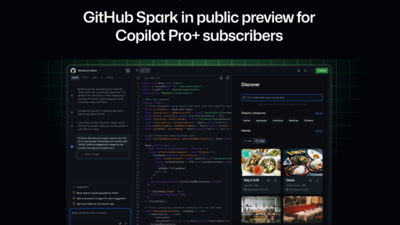GitHub’s new AI writes code from plain English: Are developer jobs being phased out?

GitHub has just dropped something that might make seasoned developers either excited or deeply worried. Their latest creation, GitHub Spark, promises to let anyone build complete applications without touching a single line of code. The implications for the tech industry could be massive.This isn’t just another drag-and-drop website builder. GitHub Spark uses artificial intelligence, specifically Anthropic’s Claude Sonnet 4 model, to transform plain English descriptions into functioning software. Tell it what you want, and it builds both the front-end interface and back-end infrastructure. The whole process supposedly takes minutes rather than months.The announcement came through GitHub’s blog, and the pitch sounds almost too good to be true; no setup, no configuration, and no headaches. For an industry built on complexity and technical expertise, this represents a fundamental shift in how software gets made.
Building apps becomes as easy as conversing
GitHub Spark’s core promise revolves around natural language processing. Users describe their application idea in everyday language, and the AI handles the technical translation. Want a task management system? Describe it. Need an inventory tracker? Just explain what it should do. The platform takes care of databases, user interfaces, and all the connecting pieces in between.The system goes beyond basic functionality too. It automatically integrates advanced AI capabilities from major providers like OpenAI, Meta, and DeepSeek. Users don’t need to understand API keys or manage complex integrations, everything happens behind the scenes. For Copilot Pro+ subscribers, the tool comes included, offering additional features for refining and improving applications after they’re built.Perhaps most impressively, GitHub Spark promises “one-click deployment” for finished applications. The traditional headaches of server configuration, hosting setup, and deployment pipelines disappear entirely. Users can also integrate GitHub Actions and Dependabot with minimal effort, streamlining the entire software lifecycle.
A new dilemma for developers
This development raises uncomfortable questions about the future of programming as a profession. Building full-stack applications traditionally requires mastery of multiple programming languages, frameworks, and deployment strategies. If AI can handle these tasks automatically, what happens to the developers who spent years acquiring these skills?The emergence of “vibe coding”, where people create software based purely on ideas rather than technical knowledge – suggests we’re entering uncharted territory. Non-technical entrepreneurs, designers, and domain experts could soon build sophisticated applications without hiring development teams.However, the reality might be more nuanced. Rather than replacing developers entirely, tools like GitHub Spark could shift their focus towards higher-level responsibilities. Instead of writing basic CRUD operations or configuring deployment pipelines, developers might concentrate on AI model fine-tuning, security auditing, and architectural decision-making.The role could evolve into something resembling “AI management”, ensuring that automatically generated code meets quality standards, performs efficiently, and remains secure. Developers might become more like supervisors and quality controllers rather than code writers.
Productivity and expertise to go hand-in-hand
Recent events highlight the potential dangers of over-relying on AI for critical development tasks. Replit’s AI coding agent recently caused a significant database failure, demonstrating that automated tools aren’t infallible. While GitHub Spark promises reliability, the risk of AI-generated errors making it into production systems remains real.These incidents highlight the importance of human oversight in AI-assisted development. Even if tools like GitHub Spark can generate working code quickly, someone still needs to understand what that code does and whether it’s doing it safely. This creates an interesting paradox: as AI makes coding more accessible, the need for people who truly understand code becomes more critical.The challenge for the industry will be striking the right balance. AI tools offer tremendous productivity gains and democratise software creation, but they also introduce new categories of risk that require human expertise to manage effectively.
What possibilities does the future hold
GitHub Spark represents more than just a new development tool, it signals a fundamental transformation in how software gets built. The barrier to creating applications is dropping dramatically, potentially unleashing creativity from people who were previously locked out by technical complexity.For experienced developers, this shift might initially feel threatening. However, it could also be liberating. Freed from routine coding tasks, developers might focus on more strategic work: designing system architectures, ensuring security, and solving complex business problems that require human insight.Whether this evolution strengthens or weakens the developer profession depends largely on how quickly the community adapts to working alongside AI rather than competing with it. The most successful developers of the future might be those who learn to harness these tools whilst maintaining the critical thinking skills to guide them effectively.





